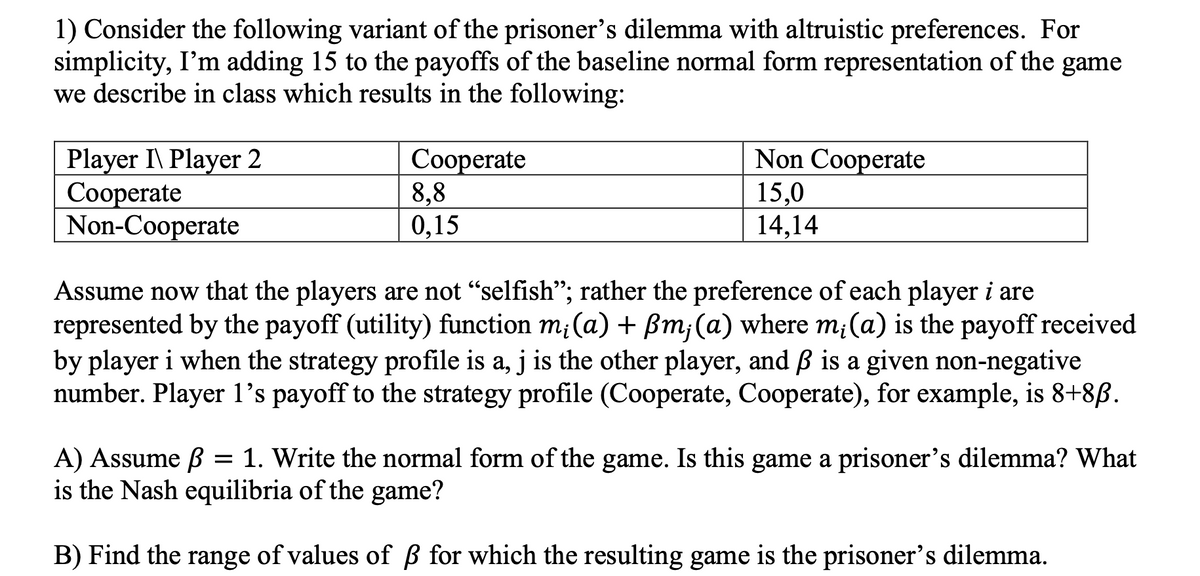1) Consider the following variant of the prisoner's dilemma with altruistic preferences. For simplicity, I'm adding 15 to the payoffs of the baseline normal form representation of the game we describe in class which results in the following: Player I\ Player 2 Cooperate Non-Cooperate Cooperate 8,8 0,15 Non Cooperate 15,0 14,14 Assume now that the players are not "selfish"; rather the preference of each player i are represented by the payoff (utility) function m¡ (a) + ßm; (a) where m; (a) is the payoff received by player i when the strategy profile is a, j is the other player, and ß is a given non-negative number. Player 1's payoff to the strategy profile (Cooperate, Cooperate), for example, is 8+8ß. A) Assume ß = 1. Write the normal form of the game. Is this game a prisoner's dilemma? What is the Nash equilibria of the game? B) Find the range of values of ß for which the resulting game is the prisoner's dilemma.
1) Consider the following variant of the prisoner's dilemma with altruistic preferences. For simplicity, I'm adding 15 to the payoffs of the baseline normal form representation of the game we describe in class which results in the following: Player I\ Player 2 Cooperate Non-Cooperate Cooperate 8,8 0,15 Non Cooperate 15,0 14,14 Assume now that the players are not "selfish"; rather the preference of each player i are represented by the payoff (utility) function m¡ (a) + ßm; (a) where m; (a) is the payoff received by player i when the strategy profile is a, j is the other player, and ß is a given non-negative number. Player 1's payoff to the strategy profile (Cooperate, Cooperate), for example, is 8+8ß. A) Assume ß = 1. Write the normal form of the game. Is this game a prisoner's dilemma? What is the Nash equilibria of the game? B) Find the range of values of ß for which the resulting game is the prisoner's dilemma.
Chapter8: Game Theory
Section: Chapter Questions
Problem 8.3P
Related questions
Question

Transcribed Image Text:1) Consider the following variant of the prisoner's dilemma with altruistic preferences. For
simplicity, I'm adding 15 to the payoffs of the baseline normal form representation of the game
we describe in class which results in the following:
Player I\ Player 2
Cooperate
Non-Cooperate
Cooperate
8.8
0,15
Non Cooperate
15,0
14,14
Assume now that the players are not “selfish”; rather the preference of each player i are
represented by the payoff (utility) function m; (a) + ßm; (a) where mi(a) is the payoff received
by player i when the strategy profile is a, j is the other player, and ß is a given non-negative
number. Player 1's payoff to the strategy profile (Cooperate, Cooperate), for example, is 8+8ß.
A) Assume ß =
1. Write the normal form of the game. Is this game a prisoner's dilemma? What
is the Nash equilibria of the game?
B) Find the range of values of ß for which the resulting game is the prisoner's dilemma.
Expert Solution
This question has been solved!
Explore an expertly crafted, step-by-step solution for a thorough understanding of key concepts.
This is a popular solution!
Trending now
This is a popular solution!
Step by step
Solved in 4 steps with 5 images

Knowledge Booster
Learn more about
Need a deep-dive on the concept behind this application? Look no further. Learn more about this topic, economics and related others by exploring similar questions and additional content below.Recommended textbooks for you


Managerial Economics: A Problem Solving Approach
Economics
ISBN:
9781337106665
Author:
Luke M. Froeb, Brian T. McCann, Michael R. Ward, Mike Shor
Publisher:
Cengage Learning

Exploring Economics
Economics
ISBN:
9781544336329
Author:
Robert L. Sexton
Publisher:
SAGE Publications, Inc


Managerial Economics: A Problem Solving Approach
Economics
ISBN:
9781337106665
Author:
Luke M. Froeb, Brian T. McCann, Michael R. Ward, Mike Shor
Publisher:
Cengage Learning

Exploring Economics
Economics
ISBN:
9781544336329
Author:
Robert L. Sexton
Publisher:
SAGE Publications, Inc

Microeconomics: Principles & Policy
Economics
ISBN:
9781337794992
Author:
William J. Baumol, Alan S. Blinder, John L. Solow
Publisher:
Cengage Learning